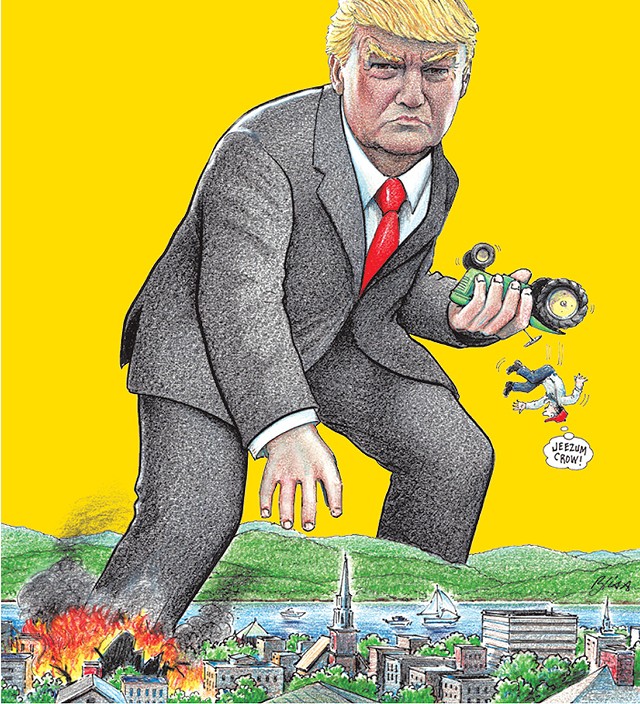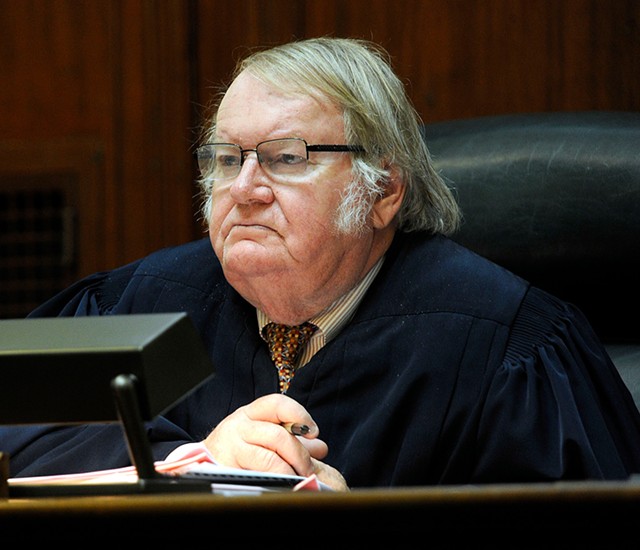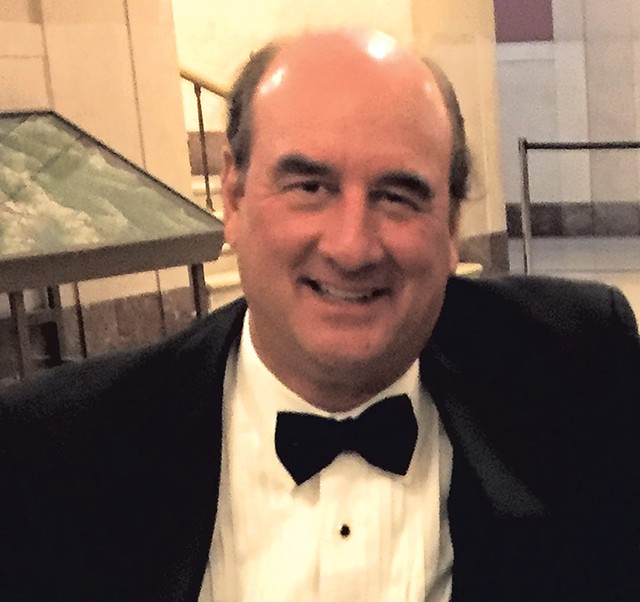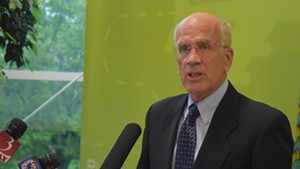
- Harry Bliss
Never in the history of American politics has a new presidency produced such drama, discord and dysfunction.
Since President Donald Trump fired Federal Bureau of Investigation director James Comey two weeks ago, hardly a day has passed without another development upending the last. Like clockwork, our smartphones and Twitter feeds have blown up with each incoming bombshell: Russians in the Oval Office, secret White House tapes, requests for loyalty, leaked intelligence, Comey memos, special counsels, grand juries.
Even here in Vermont, more than 400 miles from the White House, it can be difficult to get through a conversation without a mention of Michael Flynn, Sergey Lavrov or Robert Mueller.
So, what's a Vermonter to do? How much mental and emotional energy should we be devoting to the chaos enveloping our political system? Should we be worried about the strength and resilience of our democratic norms and institutions?
Simply put, should we be freaking out?
To answer these and other questions about the precedent-shattering Trump administration, we queried eight Vermonters with deep experience in politics and government. Our subjects, most of whom are no longer in the biz, have served in the White House, Congress, the State Department, the cabinet, the judiciary, the environmental movement, academia and state government.
Here's what they make of the 45th president.
Angst in the State Department

- File: Nancy Piette
- Robert Ford
From his home in St. Johnsbury, retired U.S. ambassador to Syria Robert Ford has watched with dismay as the Trump administration has sidelined the State Department and threatened a restructuring that could decimate the diplomatic corps.
But after three decades in the federal government — including top Foreign Service postings in Bahrain, Algeria and Iraq — Ford has also learned patience with the domestic political process.
"Administrations come, and administrations go. I'm old enough to remember when Ronald Reagan and, later, George W. Bush were elected and a lot of people were nervous and upset," he says. "So I've told people, 'Don't rush to judgment. Give it a little time. Give [Trump] your best advice. You're there to serve your country.'"
Eventually, even career diplomats may have enough — as Ford did in 2014, when he left president Barack Obama's administration over frustrations with its hands-off approach to the Syrian civil war.
"I couldn't defend the Obama theory anymore, and I left," he says. "But I didn't come to that conclusion in days or a week. It came over months. So my advice to people is, give it a little bit of time."
What are you hearing from your former colleagues?
There's a lot of concern about where the State Department is going under Secretary [Rex] Tillerson. There's a lot of angst. Some of the career diplomats assigned to jobs in Washington, D.C. are trying to get overseas and out of Washington. They're trying a little harder than in some other cases they might have!
There's a sense that the new team in the White House is not drawing on the expertise at the State Department as much as previous administrations have.
What do you think of the rather unconventional manner with which President Trump conducts international diplomacy?
I'm sure there's unease among a lot of the career diplomats about a president who tweets and does it — how shall I put it? — in a mode where there isn't a lot of consultation before he does it.
In some cases, he causes diplomatic hullabaloos — not wars, not major international incidents, but sometimes there's a little bit of cleanup to do afterwards.
What do you think the Trump administration has gotten right?
I think they were right to do the strike on the Syrian air base after the chemical weapons attack. I think Obama made a terrible mistake not doing it in 2013. So I'm glad the Trump people did it. I haven't seen Sarin gas used lately.
What keeps you up at night?
Nothing keeps me up at night! We live all the way up in Vermont, far away from things.
No, I sense that the president himself and the vice president still see the Middle East as a military problem. The problems there are primarily political and require political solutions — not military solutions.
Indefatigable

- courtesy of Paul Boisvert
- Madeleine May Kunin
Vermont's first and only female governor, Madeleine May Kunin, was hoping that 2016 would be the year a woman won the White House. Instead, it ushered in another male president — one who has appointed just four women to his 23-member cabinet.
"It's so discouraging. He feels no pressure to be inclusive," the Shelburne Democrat says of Trump. "He surrounds himself with likeminded people — mostly extremely wealthy and extremely conservative — and I don't think you can run the country that way and expect support. I mean, he hasn't made one puny gesture toward people who could bring fresh perspectives."
Kunin, who also served as the U.S. deputy secretary of education and ambassador to Switzerland, isn't giving up. She continues to work with Emerge Vermont to recruit and train women to run for office. And she's been a steady presence at public demonstrations, including the Women's March in January and the Tax March in April.
"I hope people don't get demonstration fatigue," Kunin says. "Even though [Trump] doesn't pay attention — or claims not to — Congress will. And I think things will only shift if Congress members, in both the Senate and the House, get jittery about their own reelection possibilities."
Do you think President Trump should be impeached?
I'm moving in that direction. I guess there are impeachable offenses, but I think the real big question mark remains about the Russian connection.
The real question is less of a legal one than a political one. I think there has to be some bipartisan support for impeachment for that to happen — and I think that story is still unfolding.
Some Democrats have argued that they should hold off on talking about or pushing for impeachment until after the 2018 election, when they might retake the House. Do you agree?
I don't know that we should hold off. I don't think it does any harm to discuss it or bring it out as a possibility. I think it's important to recognize that it's unlikely to happen with Republican control, but I think it helps to keep the pressure on.
I'm guessing that as a supporter of Hillary Clinton, you might have some complicated feelings about James Comey?
Well, I think you have to move on with the times — and what was devastating for Hillary can also be devastating for Trump.
I'm sure Comey himself thinks he's done the right thing. In Hillary's case, we saw him as a villain. If he was really pursuing the Russian connection against Trump, he's a hero.
He's probably somewhere in between, but I have to recognize — even though I didn't think he did the right thing with [Clinton's] emails — I think he did the right thing in the next chapter.
Time We Won't Get Back

- Courtesy Of Nancy Battaglia
- Bill McKibben
Ripton resident Bill McKibben has spent most of his career as a journalist and climate-change activist, but during the 2016 campaign season he tried on a new hat: high-profile surrogate for Sen. Bernie Sanders' (I-Vt.) presidential bid.
Now, the Middlebury College professor and 350.org founder is trying to reckon with the Trump presidency.
"Trump is a bizarre figure," McKibben says. "When [Richard] Nixon's tapes finally came out, we got a sense of what a vindictive, ugly and small human being he was. But Trump exhibits that every day out in public and on his Twitter feed."
McKibben, who is currently traveling in Africa for work, says he misses presidencies of the past, during which "you could forget about them for a few days at a time."
He notes: "This guy doesn't allow that."
What are you most worried about?
I was appalled when [U.S. Immigration and Customs Enforcement] arrested those Migrant Justice activists in Vermont.
In the short run, there are people just taking it in the neck. In the long run, the damage that he's doing on environmental stuff is the stuff that we'll never get back.
The thing that he's costing us on climate change is the thing we have the least of, which is time. He's president during an absolutely critical four years, and it's obviously going to be a wasted four years. We don't have four years to spare.
Can our government withstand the challenges we're seeing to its norms and institutions?
I don't know. I certainly hope so. But, unlike you, I'm old enough to remember Watergate, and the difference is that there were some Republicans back then who seemed willing to put principle over party.
The only way you'll get the Republicans to do anything is to make Trump so unpopular that he endangers the rest of them. They don't seem to act out of concern for the country.
What's the most effective way for citizens to make their voices heard in this political climate?
I think movement building is almost always the answer. Some of that will be electoral — and people know how to run for office and get behind campaigns. But much of it is just the advent of movement building.
The ultimate political prize is always control of the zeitgeist. That's what movements are about. And, in this case, control of the zeitgeist will be really important. Trump's lost his mastery of it, and it'll be really important that he not get it back, because he's a dangerous, dangerous guy.
Still Finding His Way

- File: Caleb Kenna
- Jim Douglas
Former Vermont governor Jim Douglas was expecting "a level of discord" no matter who won the 2016 election.
"If Secretary Clinton had prevailed, we'd have at least the same level of congressional grumbling and calls for investigation and committee hearings," he says. "So I was pessimistic about either outcome."
The Middlebury Republican, who now teaches at Middlebury College, never fully embraced Trump. He endorsed rival John Kasich late in the GOP presidential primary, but he does not see the Trump presidency in apocalyptic terms.
"The framers were brilliant. They divided power among three branches," he notes. "The checks and balances are working in the way the framers of the Constitution intended."
How do you think Trump is doing so far?
It's an unusual presidency. He's the first with no experience in government service — either civilian or military. It's a different environment from running a business.
I think he's having trouble adjusting to scrutiny and the environment of political office. He's still finding his way.
Do you think he's violating important governmental norms?
He's the ultimate outsider — and that's what Americans wanted, because they didn't think the traditional class of leaders was getting the job done.
I don't think it's bad to shake things up.
Do you think Trump is getting a fair hearing from the news media?
Well, we only know what we hear through the media, so how do we know?
Without question, the political orientation of the media who cover politics and government is not consistent with the average American. It's well to the left. Then the president provides generous fodder for cynicism and adverse reporting. He certainly has picked fights with the media — and that no doubt exacerbates the relationship.
He's also chosen, as we all know, to bypass the media, in terms of communicating directly with the American people. That's a pretty good strategy if you believe your message is not being accurately conveyed.
What advice would you give members of Trump's White House staff in these difficult times?
You'll serve him better if you give him your unvarnished advice — and that may be difficult for a personality like his. I worked for a strong personality myself, governor [Richard] Snelling, and it wasn't always easy to give him bad news or an opinion that I expected wasn't going to be well received. But I felt that I owed it to him and, in the long run, would serve him better if I offered it.
How would you bring bad news or criticism to governor Snelling in a way that got the message across?
Well, first I'd find the right opportunity. Sometimes I'd say, "Well, maybe this isn't the best day."
Why do you think this White House is as leaky as it is?
Well, it's disappointing. I understand the phenomenon. People like to show that they're on the inside and have the scoop on the juicy things going on. It's a natural instinct. But it's not what any president deserves.
The people who are leaking ought to be invited to pursue a different career if they can be identified.
Trapped in the West Wing

- Courtesy Of Ellen Mcculloch-lovell
- Ellen McCulloch-Lovell
Ellen McCulloch-Lovell knows what it’s like to toil away in a scandal-plagued White House. After a decade as Sen. Patrick Leahy’s (D-Vt.) chief of staff, she went to work for the Clinton administration in 1997 as first lady Hillary Clinton’s deputy chief of staff. Four years and one impeachment later, she left as deputy assistant to president Bill Clinton.
“I actually have some sympathy for those folks,” she says of Trump’s White House staff. “It’s a really hard job to begin with, and they’re constantly having the rug pulled out beneath them by the chief executive. They go out there with their talking points, and it turns out they’re not true.”
McCulloch-Lovell, who lives in Montpelier, served as president of Marlboro College for 11 years and now consults for the Episcopal Church at Rock Point in Burlington. She has some advice for those who find themselves trapped in the West Wing.
“I would say, ‘Put your heads down and do your jobs.’ I think that the Clinton White House functioned as well as it did because people were incredibly disciplined,” says McCulloch- Lovell. “It’s really, really important to keep that focus — and I don’t think this White House has a focus.”
What’s surprised you the most about the Trump administration?
I haven’t been terribly surprised because I actually expected the total incompetence that has been demonstrated these last four months. I’m of the strong opinion that business experience — especially of failed businesses — is not a qualification for being president of an important democracy.
I do have one surprise: I’m really surprised nobody took away his Twitter account.
What institutions or individuals have distinguished themselves in the Trump era?
I was really critical of and disillusioned by the media, with journalists, during the campaign — and now I think they’re doing their jobs.
I thought they were so fascinated with every twist and turn of the Trump campaign, and they must’ve seen some benefit in the ratings that they basically ran him uncensored. I’m a news hound from way back. I would just watch — especially with cable news — with dismay as they broke away from something that was true news to candidate Trump about to address a rally.
But now, given the volatility of this administration, I think they are really waking up to and rediscovering their roles as part of what keeps government officials accountable.
You worked in the Senate for many years. How do you think Congress is doing?
I think that the Republicans in the House were just giddy with the opportunity to pass their agenda, and they see Trump as a vehicle to do that.
Republicans in both the House and Senate have always been more disciplined than Democrats. Was it Will Rogers who said, “I don’t belong to any organized political party — I’m a Democrat”? We’re seeing that with this determination to repeal and replace Obamacare.
My hope, really, is that members of Congress will understand their role in government. I’m really hoping that Americans will see them defending their country — be less cynical and have more faith in Congress.
Executive Disorder

- File: Jeb Wallace-brodeur
- John Dooley
During his three decades serving on the Vermont Supreme Court, John Dooley had to refrain from opining about the political issues of the day. But following his retirement from the bench in March, he has been free to speak his mind — and he has plenty to say about the Trump administration.
Dooley has been particularly offended by the administration's propensity to govern by executive order.
"It's a very undesirable thing," he says. "It's very clear that less work goes into this sort of thing than if it was being done through the normal routes. The quality of [the orders] seems to show that there's some serious problems in the way they're being developed."
Case in point: Trump's January executive order, released late on a Friday afternoon, barring travel and immigration from seven Muslim-majority nations.
"You had people on planes. You had people in airports. You had people with all sorts of documents that said they could come to the United States, and the order didn't deal with any of them, and it was up to people on the ground to interpret it," Dooley exclaims. "That is not the way to run a government."
What's surprised you the most about the Trump administration?
Everything seems to come entirely from the level of the president. I think most chief executives would think that's not a particularly good thing — that, first of all, micromanaging a whole government is not going to be very effective, even at the little State of Vermont level.
I'm just surprised at how much — hour by hour, minute by minute, day by day — it's all Trump.
What do you think the Trump administration has gotten right?
They did a nice job on the [Neil Gorsuch] Supreme Court appointment. It isn't necessarily somebody I would've appointed, but that isn't the point. I think they went through an effective process.
They showed they're capable of doing it right — but doing it that way hasn't been their hallmark.
What institutions or individuals have distinguished themselves in the Trump era?
Of course, you're talking to a judge, so you're not going to be surprised when I will tell you that the judicial branch has done a good job. I can't say I think the same of the legislative branch. I think there are some places where there was need for more pushback from the legislative branch, and it hasn't come.
What do you make of the way Trump has described the judicial branch and, in some cases, specific judges?
I do think that's something that tears down institutions and can have very long-term harm.
We haven't seen it now for a little while, so you hope that rhetoric is letting up. But that is very destructive rhetoric for the rule of law and the system we depend on.
Schmoozer in Chief

- Courtesy Of Skip Vallee
- Rodolphe "Skip" Vallee
When president George W. Bush appointed Rodolphe "Skip" Vallee ambassador to Slovakia in 2005, the Shelburne oilman didn't know what to expect.
"I came into the job reflecting the president's conservatism, thinking that everyone running around the State Department was a lefty liberal trying to undermine the president at every turn. So you can imagine what some of the Trump people are like!" he says. "What was a surprise to me was just the absolute professionalism."
These days, Vallee is best known in Vermont for leading his family's gasoline empire, R.L. Vallee, Inc., which includes the Maplefields gas stations — and for antagonizing Sen. Sanders. But he got his start in 1982 in Washington, D.C., as a young staffer for Vermont's then-senator Robert Stafford on the U.S. Senate Subcommittee on Education.
Vallee backed Sen. Marco Rubio (R-Fla.) during the 2016 Republican primary, but he says he's been impressed by Trump's early foreign policy moves — particularly the president's "aggressive posture" toward North Korea.
"I don't know the guy. I've never met him. But I think he feeds on and values personal interaction with other people, and I think Donald Trump is very effective in that atmosphere," Vallee says. "Obama ran for the closets when he had to schmooze."
What's surprised you the most about the Trump administration?
The extraordinary quality of the people he's surrounded himself with. I think it starts with his choice of vice president [Mike Pence]. I think Rex Tillerson is a wonderful choice. And before you jump on the oil thing, it has nothing to do with the fact that he's an oil guy! I think when Tillerson speaks, there's a degree of confidence.
What's disappointing is the slow pace in putting in some of the subsidiary positions: the deputy secretaries, the undersecretaries. Part of that, I think, is sort of a new team not knowing the process. When Bush came in, he could bring into his transition huge elements of his father's team who had been through this drill before. I think Trump didn't have the benefit of that.
How are congressional Republicans doing?
They've gotta produce what they ran on. They all ran on getting rid of Obamacare. You can debate the merits of Obamacare, but I'm someone who says, if you run on something, you don't back away when you get elected.
What's the best way to get to the bottom of Trump's Russia scandal?
I think the appointment of [former FBI director Robert] Mueller as special counsel within the auspices of the Justice Department to focus within the parameters of a normal prosecutor is probably a pretty good thing. His integrity in this highly charged atmosphere brings credibility to whatever conclusion he comes to.
I think it gives people comfort that this is a result that will be respected by the general public, based on the quality of the person doing the analysis.
Do you think Trump will be impeached?
I see no evidence thus far that would lead me to that conclusion. I think [House Minority Leader] Nancy Pelosi has said the same.
If you were advising Trump and his staff on how to deal with this investigation, what would you say?
This sort of scrutiny goes with the job, and you've just gotta deal with it. And if the president is right that there's nothing to these allegations, then it eventually goes away.
Congressional Dysfunction

- courtesy of Sally McCay
- Eileen Burgin
University of Vermont professor Eileen Burgin has studied American politics — and Congress in particular — for decades. But the Richmond resident still finds herself shocked by what she calls the "complete ineptitude" of the Trump administration.
"I had assumed that his staff would be able, in some way, to get him under control — and they've completely failed to do so," she says. "We've watched the administration go from one disaster to the next, thinking each time that it can't get more outrageous — and it does."
Burgin, who spent five years as a congressional aide early in her career, says she's particularly concerned that the Republican House and Senate are "failing to hold the president accountable and [are] apprehensive about exercising Congress' constitutional and institutional prerogatives and fully engaging in true oversight."
What do you think a responsible Congress would be doing at this present moment?
Fully investigating the range of issues that should be investigated with fully functioning staff. When you have oversight investigations and you do not amply staff them, they're simply a charade. And that's what's happening right now.
Do you fear that the appointment of a special counsel will interfere with ongoing congressional investigations?
I think special counsels, independent commissions and congressional investigations all do different things and are all very necessary.
How damaging is it that Congress ended the use of the filibuster in Supreme Court nominations?
It's very damaging for the judiciary, because the Supreme Court should not be seen as simply a partisan institution. When the filibuster is removed for Supreme Court nominations, it enables presidents to nominate completely partisan individuals if the Senate is of the president's party. Given that we see presidents nominating young people who may serve on the court for 40 or more years, this can be very damaging to the court and, therefore, the nation more broadly.
I think the other real concern I have about [Senate Majority Leader] Mitch McConnell exercising the nuclear option is that it lets people think more about eliminating the filibuster on legislation more broadly. While there are problems with the filibuster, it is an extremely important safeguard in our government — and its elimination, I believe, would do grave damage. So, my hope is that this is not a slippery slope.
Why do you think Republicans are having such a hard time repealing portions of the Affordable Care Act?
No. 1, we've never in this country provided benefits to a group of people and then taken those benefits away in the manner in which Republicans are considering doing. No. 2, the Affordable Care Act is a complex combination of a lot of different provisions, and you can't just pull away one provision and have the rest of it work.
I think it's interesting to note that the Republicans didn't start out by saying they would repeal "portions" of the Affordable Care Act. They started off saying they would repeal the whole thing — and they passed legislation over 60 times in the House of Representatives to repeal the whole thing. But serving as an opposition party, as the Republicans did for many years, simply saying no to what the Obama administration wanted, is a lot easier than governing.
Can our government withstand the challenges it's seeing to its norms and institutions?
I profoundly hope so.












Comments (19)
Showing 1-19 of 19
Comments are closed.
From 2014-2020, Seven Days allowed readers to comment on all stories posted on our website. While we've appreciated the suggestions and insights, right now Seven Days is prioritizing our core mission — producing high-quality, responsible local journalism — over moderating online debates between readers.
To criticize, correct or praise our reporting, please send us a letter to the editor or send us a tip. We’ll check it out and report the results.
Online comments may return when we have better tech tools for managing them. Thanks for reading.